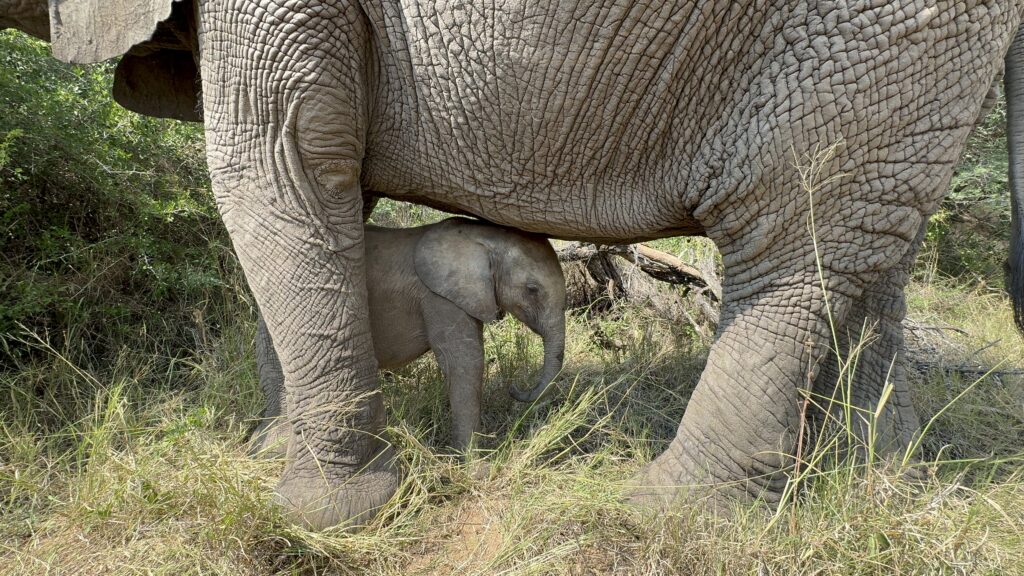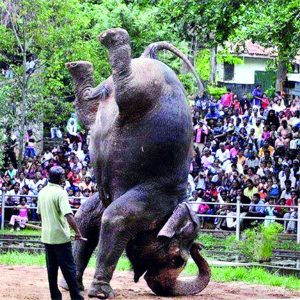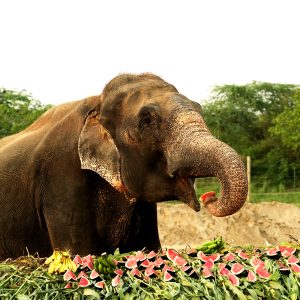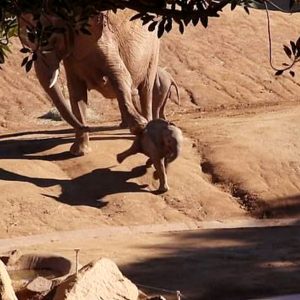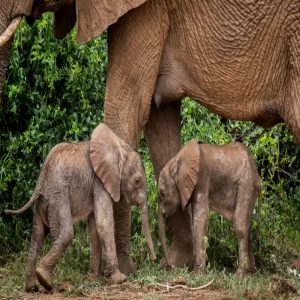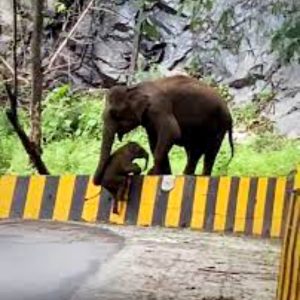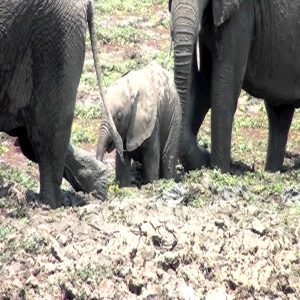An unusual event took place as Tokwe, Lundi and some of the other elephants headed to the orphanage to find out where Phabeni was. Normally the herd walk in the opposite direction into the bush for their day of roaming. Matriarch Tokwe led the elephants (and Owen).
Elephants are incredibly intelligent animals and know when something is wrong. It is an emotional moment as Tokwe and the herd no doubt realised that Phabeni was not joining them, and is no longer at the orphanage. There is no way of avoiding this stress, this pain of losing a loved one, not for elephants or humans.
Lundi investigated the smells on the ground closest to the orphanage. Phabeni’s adoptive mother, Setombe joined in the front to trace the scents and detect signs of her baby. Among the elephants here were: Tokwe, Lundi, Kumbura, Fishan, Jabulani, Setombe, Bubi, Zindoga and Klaserie.
During Phabeni’s last night, and in the morning, during his passing, the herd stood outside the orphanage gate. They gathered there. After a while, they turned around and went to the stand under the homestead roof, waiting for the carers.
Adine thought of putting Phabeni’s body outside for the herd to smell and say their goodbyes. But ultimately after much deliberation with the carers, we decided against it.The reason for this decision was that Stavros, Liverson and Adine’s scents covered Phabeni’s body, and we feared the herd might think that we harmed the calf and so see us as a threat.
The day after Phabeni passed away, the females were in the bush and turned back, and came to the gate. We are not sure if they were looking for Phabeni, but it appeared as though they were coming to pay their respects, as you would at a funeral.
Phabeni’s death is not taken lightly and our veterinary advisors are having many conversations about the possibilities of the causes of death. We need to look at every possible way to prevent future elephant orphans from going through a similar scenario.
We do believe that teething added a considerable challenge for Phabeni. At the age of 8 months, babies usually start teething or tusking, and it takes approximately 2 to 3 months for the first tusk to show.During this period, the babies lose their appetite, and as they are on a milk formula, which is not as good as their mother’s own milk, they do not have the antibodies to fight any infection on their own. The calves are delicate and not one recipe is standard for all baby elephants up to the age of 2,5 years. Phabeni’s first tusk was cut a few weeks before he passed away, and the second tusk was extremely swollen.
As per the words and expertise of Sheldrick Wildlife Trust and their elephant orphanage in Kenya:
“No-one knows the secret of wild natural Mother Elephants, whose calves cut their initial first four molars seemingly without any problem, but here in our Nairobi Nursery the teething process is invariably life threatening. We have lost many otherwise healthy calves during this critical process. In a captive situation the teething in baby elephants, occurs between the age of 1 and 4 months, triggers fevers, lethargy, loss of appetite and life threatening diarrheoa that is difficult to bring under control, not helped by the fact that the formula of the humanized base milk we use has apparently been adjusted by subsequent manufacturers, and is not quite as good as it used to be for essentially fragile infant elephant babies. During teething elephant babies usually have to be put on intravenous life supporting electrolytes to replace the fluids they have lost through diarrheoa.”
“Nature has made infant African elephants exceedingly fragile; they can be fine one day and dead the next and one can never be sure that a calf will survive until it is past its second birthday. “The hand-rearing of orphaned elephants is an emotional roller-coaster for those involved, for tragedy stalks success and can strike unexpectedly at any moment.”
– Daphne Sheldrick
We need to be strong and continue on for the health and well-being of the rest of the herd in our care. Just because the odds are against us it doesn’t mean that we shouldn’t still try to save a life where we can.
